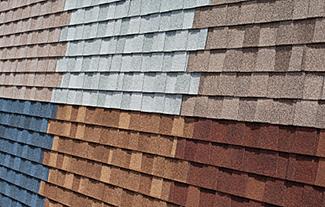
Asphalt shingles are the most popular roofing type in North America. Inexpensive and easy to install, they are available in a wide variety of styles and properties. Whether you plan to have a licensed installer provide your shingles, or you plan to shingle the roof yourself, learn the different varieties available to help make the right decision for your roof.
Choosing Asphalt Shingles
While many consumers focus on warranties, many home improvement experts are quick to point out that most warranties are little more than sales tactics. Instead, a consumer should look for shingles that are made to meet specific industry standards and hire an experienced roofing contractor to install them. An informed consumer should also pick which type of shingle will work best for his home and climate.

There are two basic types of asphalt shingles: Fiberglass and organic. Both are bound together with asphalt and contain an asphalt coating to make them weatherproof, but they are constructed in extremely different ways.
Fiberglass Shingles
Fiberglass shingles are the lightest and thinnest type of shingle, making them the easiest type of shingle to move and install. They are made of a mat of fiberglass that is then coated in asphalt. Fiberglass shingles are popular in southern areas of the United States. Fiberglass shingles also have a higher fire rating than other types of asphalt shingle. Look for fiberglass shingles that meet ASTM D-3462 standards.
Newer fiberglass shingles are frequently made of two layers, which are laminated together. This gives the shingles more depth and more variety in terms of style.
Organic Shingles
Organic shingles are preferred in colder regions because they are more flexible than fiberglass shingles in low temperatures. Rather than having a fiberglass mat, a cellulose fiber mat is covered with soft asphalt and then coated in a harder asphalt. Due to the cellulose mat as well as the two layers of asphalt, organic shingles are far heavier than fiberglass shingles. Look for shingles that meet STM D-225 standards. In general, a higher quality organic shingle will also be heavier.
Organic shingles typically cost about 40 percent more than fiberglass shingles, and are not as fire resistant as fiberglass shingles. Some types of organic asphalt shingles are more durable than fiberglass, however, and are a better option for homes that are located in areas that get high winds and heavy storms, as they are less likely to come off or tear.
Architectural Shingles

In addition to traditional two tab or three tab asphalt shingles, architectural shingles are available. Architectural shingles are made of laminated fiberglass, giving them all the benefits of traditional fiberglass shingles, with a newer look. This type of shingle mimics almost any type of material, including slate, wood or even metal shingles. Unlike traditional shingles, architectural asphalt shingles are often laid in random patterns to further imitate another material.
While many homeowners appreciate the appearance of slate or wood without the higher price, many designers avoid these types of shingles because they are inauthentic. For homeowners with the same concerns, architectural shingles are available in colors and patterns that imitate no other type of material.
Architectural shingles are typically less expensive than the roofing materials that they imitate, but they do cost more than traditional asphalt shingles.
Considering Asphalt Versus Other Roofs
Asphalt shingles are one of the least expensive types of roofing material on the market. They cost considerably less than either slate or metal roofs, and can be installed on top of an existing layer of shingles.
Asphalt roofs may not last as long as other roofing materials, however. While a slate roof may last up to 100 years and a metal roof may last up to 50 years, asphalt roofs typically last only about 20 years. Asphalt shingles may do best in climates not subject to heavy storms or high winds, where the shingles may be torn. They are also ideal for do-it-yourself homeowners who may not have experience with roofing materials, as they are easier to install than other materials.
Installation Concerns

Due to the high cost of labor, plan on purchasing the best shingles you can afford. Carefully read the manufacturer's literature and make note of any actions that could void the warranty. Common actions that violate a warranty are installing shingles without a licensed contractor or applying new shingles over an existing roof.
Layering Shingles
In an attempt to save on labor and waste disposal costs, layering new shingles over an existing roof has become popular. In addition to possibly voiding the shingle's warranty, layering shingles has several other significant drawbacks. The largest drawback is the added weight on the roof. Some building codes will not allow layering for this reason. Other building codes will only allow the shingles to be layered once, leaving an even more expensive removal and replacement job when the new shingles must be replaced.
Manufacturers discourage shingle layering because cupped, warped, or otherwise damaged old shingles can affect the new materials. Layering shingles can also cause moisture to become trapped between the layers, causing premature rotting of structural roofing members. Avoiding a full tear off also deprives your contractor of the opportunity to identify and fix any potential problems before a leak occurs.
An Important Part of the Home
The roof is one of the most expensive components of any house. A poorly installed roof can cause expensive home repair costs that over time can easily exceed the initial cost of hiring a licensed contractor. Of course, hiring the right contractor to install asphalt shingles is crucial. For this reason, be sure to solicit recommendations from friends and neighbors.







